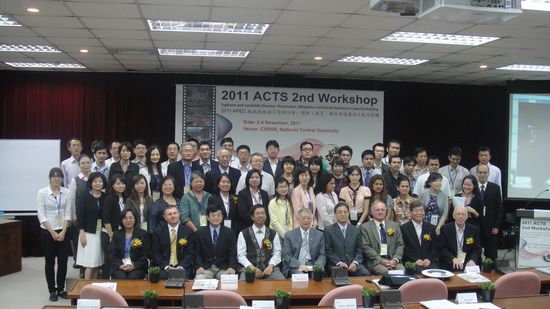


Reconstruction Council Shares Morakot Experience at APEC Typhoon and Landslide Disaster Prevention Symposium

The Executive Yuan’s Morakot Post-Disaster Reconstruction Council has launched the permanent housing base Pulami (which means bountiful harvest in the language of the Paiwan tribe) project for accelerated integration and management on construction progress for sustainable communities in the various permanent housing bases. Deputy CEO Chern Jenn-Chuan of the Reconstruction Council attended the 2011 Typhoon and Landslide Disaster Prevention Symposium hosted by the APEC Research Center for Typhoon and Society (ACTS) on November 2nd. During his speech, he stated that as post-Morakot reconstruction has entered its third year and residents have begun moving into permanent housing units, the Reconstruction Council will go over and consolidate the needs and items which require resolving for each base in the current stage, as well as keep a close eye on the details of various job implementations. The hope is to bring residents moving into the permanent housing bases normalcy once more in the shortest time possible.
On November 2nd and 3rd, ACTS held the 2011 Typhoon and Landslide Disaster Prevention Symposium at the Center for Space and Remote Sensing Research National Central University. Experts and scholars from Taiwan and overseas were invited to share their experiences with extreme climate, slope disaster, and disaster recovery and reconstruction with the theme of Prevention, Disaster Reduction, and the Construction of Social Adaptation Capabilities. A total of 85 experts and scholars took part in the symposium, from Japan, the Philippines, Korea, Vietnam, Thailand, US, Nicaragua, UK, Hong Kong, Taiwan, and other places. Deputy CEO Chern Jenn-Chuan of the Reconstruction Council was also invited to give a speech sharing reconstruction results and experiences with experts and scholars from around the world. Participants resonated with what he shared.
Deputy CEO Chern spoke especially on The Post-Morakot Social Response. He stressed that Taiwan has begun to establish a preliminary social management model after the experience of post-Morakot reconstruction. The disaster prevention and rescue capabilities of the government, private NGOs and corporations have been effectively consolidated, with a realization of the key points to disaster prevention and rescue: “disaster prevention is more important than rescue, disaster elimination is more important than prevention”, “always be prepared for enemies and take defense as a serious matter”, and also “station plans beforehand, preset troops, and be prepared for prevention and rescue at all times”. This was the reason that Taiwan has not experienced any major fatalities in areas which were heavily hit by Typhoon Morakot, although several typhoons and storms have passed through since then, such as Typhoon Parma, Typhoon Fanapi, and Typhoon Nanmadol. Each time, thousands of people were evacuated, the army prepared reinforcements, and the central and local governments made advanced preparations.
Deputy CEO Chern pointed out that post-disaster reconstruction focuses on human-centralism according to the Special Act. People’s lives are at the core of this, with respect for diverse cultures, guaranteeing community participation, homeland preservation, conservation of environmental resources and so forth. In terms of the implementation strategy, public-private partnerships will be adopted to properly utilize governmental and private resources with speedy completion of reconstruction work. For example, the construction of permanent housing adapted a model where the government cooperated with NGOs to each do what they do best. With kindness streaming in from all sources, 90% of the total amount of permanent housing needed was complete by the second disaster anniversary. The efficiency was exceptional, as more than 10,000 people benefitted from 2,946 permanent housing units.
Lastly, deputy CEO Chern invited the experts present to attend the Society for Social Management Systems (SSMS) International Assembly which will be held at the start of May 2012. The assembly will focus on disaster management systems. Governments, NGOs, and corporations from various nations will be invited to discuss the establishment of a social management system to fortify disaster prevention, rescue, and reconstruction mechanisms in addition to enhancing the international mutual aid mechanism as a way to reduce the risk and damages caused by giant compound disasters.
陳副執行長與國內外貴賓合照






